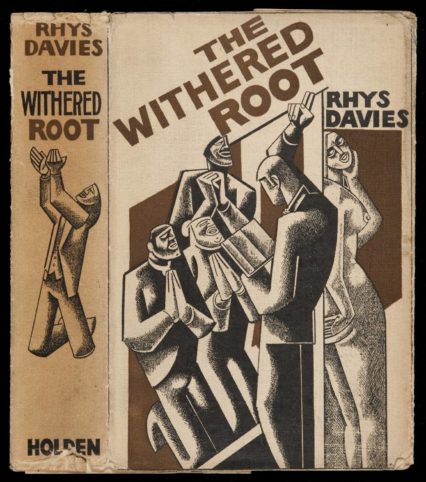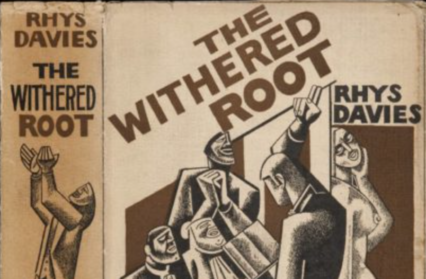Continuing in our search for the Greatest Welsh Novel, Dylan Moore nominates Rhys Davies’ ‘quintessentially Welsh’ novel The Withered Root.
What I am about to reveal probably invalidates my nomination of Rhys Davies’ The Withered Root as one of the Greatest Welsh Novels of all time. It may even undermine our whole business of trying to choose a Greatest Welsh Novel.
I have not read every novel Rhys Davies wrote. In fact, I have only read one. The Withered Root.
Given that Davies wrote eighteen novels, that hardly qualifies me as somebody permitted to pontificate on the greatness or otherwise of Davies’ output. Maybe rather than writing an essay in praise of the very fine novel The Withered Root, I should be settling down in an armchair with A Time to Laugh, the next Davies title in the Library of Wales series.
Of course, the Library of Wales is going to be absolutely crucial to my argument. Quite apart from the fact I’d be willing to wager that with the possible exception of Davies’ biographer Meic Stephens, nobody has read cover-to-cover all eighteen of Davies’ novels, the Library of Wales project itself deserves huge credit in the sense that I can write in the knowledge that a significant proportion of the Wales Arts Review audience will at least be aware of The Withered Root’s existence. It brings the absolute necessity of the Library of Wales’ existence into sharp focus to imagine a similar poll being conducted in England where, for example, a reasonably highbrow literary publication could not rely on its audience having a strong awareness of, say, The Rainbow or Jude the Obscure.
As a sixthformer in a Welsh school and an undergraduate in a Welsh university in the late 1990s and early 2000s, I was largely unaware of the idea that there might be any Welsh novel that might be considered great, let alone the number required to make the current debate stimulated by Wales Arts Review a worthwhile enterprise. At Cardiff, I did take a couple of niche modules, populated overwhelmingly by the ‘home crowd’: Professor Stephen Knight’s ‘Welsh Fiction in English’ and another on ‘the Thomases’, Dylan and R.S. But for the most part my Literature courses were a diet of representations of Englishness, with some side-dish Americana; tellingly, any considerations of post-colonialism were contextualised in the far-flung outposts of Empire, not in the somewhat ‘Anglo-Welsh’ city where we sat.
Two opinions of Rhys Davies that have come to prevail in Wales are that he has been inexplicably overlooked by the literary establishment, particularly in England, and that his nearest equivalent in the canon of English Literature is D.H. Lawrence. Lewis Davies’ play Sex and Power at the Beau Rivage emphasised the biographical link between the two free spirits of Britain’s interwar era, but the best evidence of a Lawrentian influence at work in Davies is in the work itself.
The connection between the two writers goes far beyond the fact that they met or the personal and sociological parallels, both men being sensitive souls who had grown up within the tough environs of a traditional mining community: Lawrence in Eastfield; Davies in Blaenclydach. There is something in The Withered Root that shares the very atmosphere of a Lawrence masterpiece. Maybe it is the central tension between the world of the body and the world of the spirit, the dichotomy between sexual attraction and spiritual calling that threatens to pull young Reuben Daniels apart. Maybe it is the cramped atmosphere of inter-generational conflict and misunderstanding in the small terraced house inhabited by Daniels, his alcoholic mother and somewhat weak-willed father. Or maybe it is simply that Davies, like his English counterpart, is simply a world class writer.
It seems crude to talk about fictionists in such terms, as if they were footballers or heritage sites. But for the purposes of this competition – and what else is the Greatest Welsh Novel series if not a Champions League for storybooks – we need to be clear in our minds about the Great and the merely very good. And as the competition enters its latter stages and intensifies, we also need to be clear about our criteria. The Withered Root is a novel that captures, in rarefied prose, a quintessential element of Welshness. That it is a strand of Welsh life largely forgotten by the vast majority of the public makes it all the more important as a historical document. Through fiction we remember.
A highly accomplished fictional treatment of the 1904-5 spiritual Revival during which tens of thousands made an emotional commitment to Jesus Christ, Davies’ focus on the ‘Evan Roberts’ figure of Daniels – a man with a clear divine calling but also in possession of the heady cocktail of the weaknesses of the flesh and a magnetic sexual attraction – makes The Withered Root a classic of the period, one of those carefully-constructed bildungsromans that build in almost claustrophobic intensity as we come to share the protagonist’s struggles. It is therefore, I think, not a Great Welsh Novel, but simply a great novel that happens to be Welsh; we should be grateful that it, and he, was so.
All of which is to say that I am looking forward to consuming, over the coming years, the remainder of Davies’ oeuvre and that I hope many more titles follow in the Library of Wales. But I would also be surprised if Davies wrote a better novel. Indeed, if any of his seventeen others are on a par with The Withered Root, then this list should be as chock-full with Davies as its equivalent in poetry would no doubt be dominated by Thomases.
This piece is a part of Wales Arts Review’s ‘Greatest Welsh Novel’ series.
Dylan Moore has contributed regularly to Wales Arts Review.












